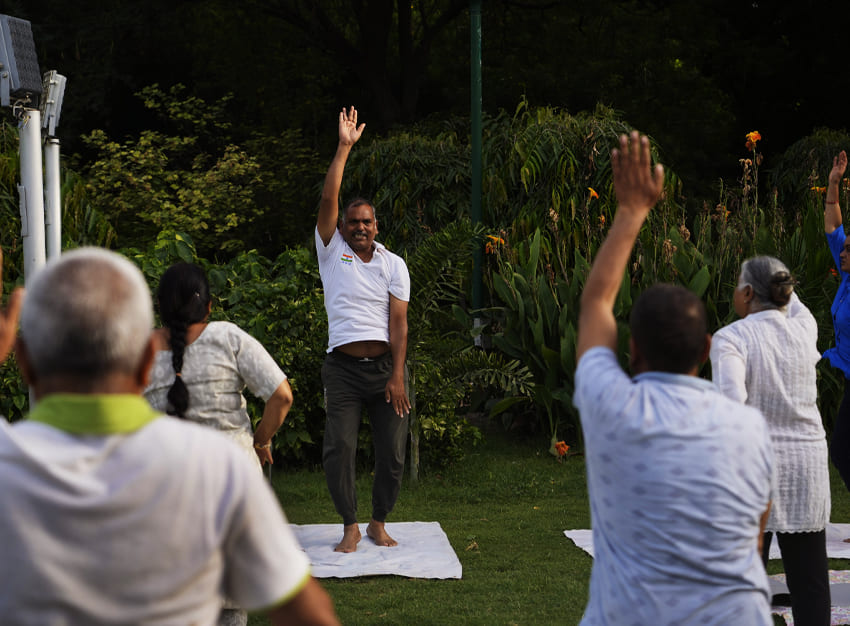– Dr. M.L. Sharma Principal (Retd.)
The survival of man is physical and activity is considered the elixir of life.
The activity is the first and foremost important thing one learns soon after birth. It is an activity or movement by which a child expresses the desire for hunger, thirst etc. Speech comes much later. Nature has designed human beings for physical activities. He has strong muscular and nervous mechanisms. No other living organism has such a well-developed nervous system as the human being has.
Our forefathers were very strong, active physically as compared to the present generation. In the modern age, one depends more on electronic gadgets. Instead of walk-ing, we drive now, instead of climbing we use elevators or lifts. Our association with fauna and flora is diminishing. Our body is very precious and we cannot afford to ignore it. We’ll have to pay the price for using our heads more and saving our hands.
Weakness makes us slaves and strength sets us free.
Motor qualities such as strength, endurance, flexibility, speed, agility are developed by taking part in large-muscle activities.
Fitness keeps us away from many diseases. It makes our life enjoyable. A fit citizen is an asset to the nation whereas a sick person is a burden on nature. As a developing nation we cannot bear the huge economic burden of deadly lifestyle diseases like diabetes and heart diseases. Heart diseases can be prevented as these are related to the lifestyle of the individual. Some of the risk factors for heart diseases are diabetes, high blood pressure, high blood cholesterol, consumption of tobacco, alcohol, obesity, stress and less physical exercise. Smoker’s risk of having a heart attack is twice more than that of non-smokers. Smoking speeds up the development of plaque in the arteries. It also reduces HDL, the good cholesterol level and in. creases the stickiness of blood cells causing blood clots inside the arteries.
Diet and exercise are known to play a key role in controlling the heart prob. lems. It is important to know that minimum 30 mts of exercise daily or five days a week can lead to immense effects on health. Several servings of vegetables, fruits, and oil lowest in saturated fats are some ways towards a healthy lifestyle. Intake of sugar be kept to minimum. Regular checkup is also a must.
Most of the risk factors for heart disease are silent and therefore one needs to keep regular watch over weight, glucose levels, blood pressure to preempt the dis-ease. One can combat the disease at gross root level by simply being more aware about risk factors.
Many lifestyle diseases have their origin in childhood. Unhealthy eating habits among children lead to lifestyle diseases like obesity, diabetes and heart diseases later in life. This calls for the need to educate children about ill effects of junk food and unhealthy snacking. Junk food and carbonated drinks are bad for health.
People in the metros are not only hard pressed for time but also for open spaces to exercise. The existing ones are getting more over-crowded leading to children spending more time in front of TV and computer screens.
A number of young people these days have hectic days and unfortunately use the weekends to experiment with drug and and alcohol. This adds to the load on the heart. Leisure should be the time to relax both body and mind. The negative effects of this hectic lifestyle may not show on the body but there is an internal turmoil going on. Don’t be overconfident about your fitness. So stay alert and stay protected. If you are experiencing breathlessness after your daily workout session or you are noticing an unusual amount of sweat for the last few days, do consult a doctor. You lay the foundation stone to your well being in your 20s and 30s. So be careful not to mess up with your heart and other vital organs.
Here are some do’s and don’ts-
(1) Quit Smoking : You are educated enough not to heed these dreadful anti-tobacco ads.
(2) Know your BP and cholesterol level: Get regular check ups. Getting tested for diabetes is a must.
(3) Exercise regularly and moderately.
(4) Add plenty of fresh fruits and vegetables to your diet. Eat at home. Food outside home most often contains heart damaging fats.
(5) Avoid junk food : Say big no to foods containing saturated fats and trans fats such as deep fried food, chips etc. Cut red meat, salt intake. Avoid processed foods.
(6) Consult a doctor, dietician or expert regarding your BMI.
(7) Get enough sleep.
(8) Tame the lipids by eating a healthy diet. Avoid butter, cheese, pastries. Take soluble fibers present in barley, oats, beans. Fenugreek seeds, flax seed, garlic, and isabgol help in reducing bad cholesterol.
(9) Include Yoga and meditation.
(10) Avoid stressful hectic life.

